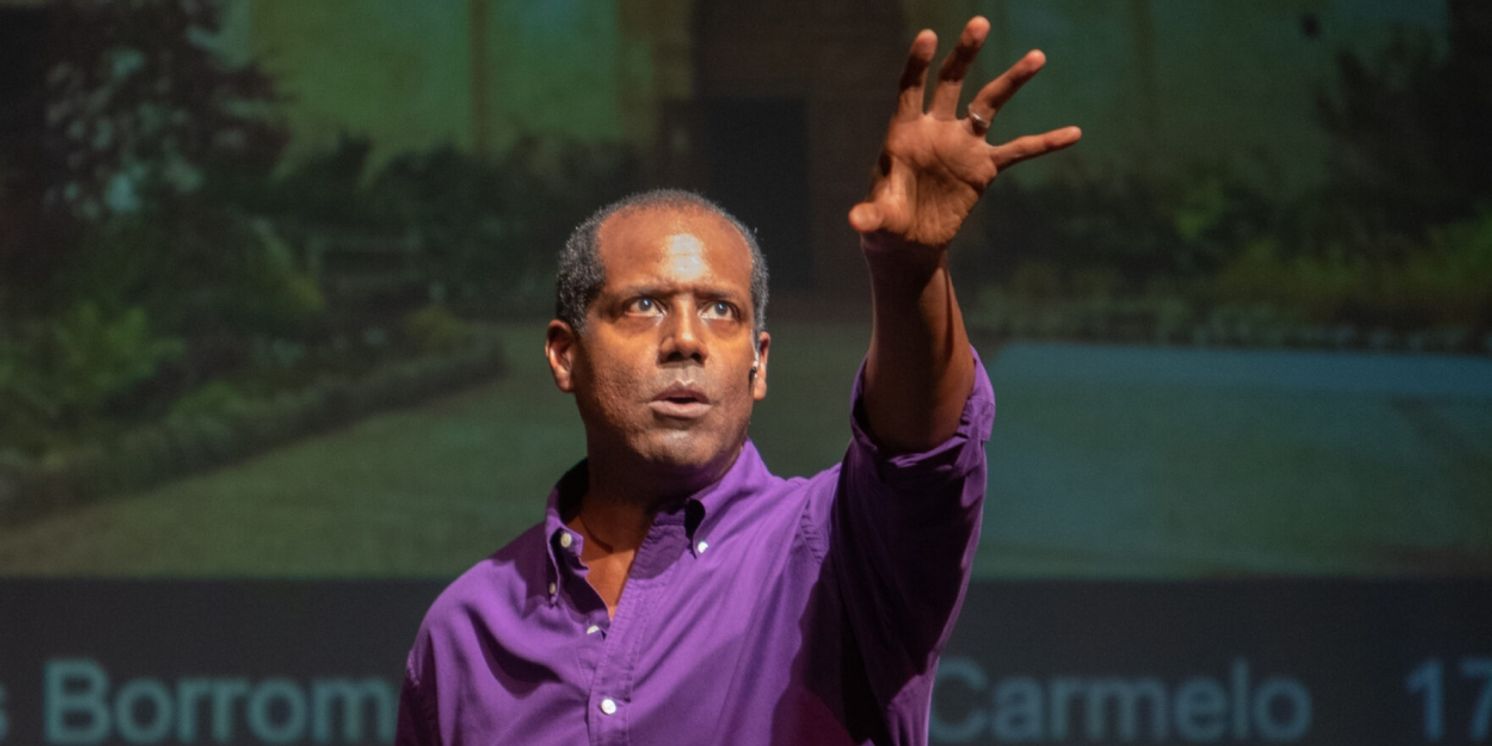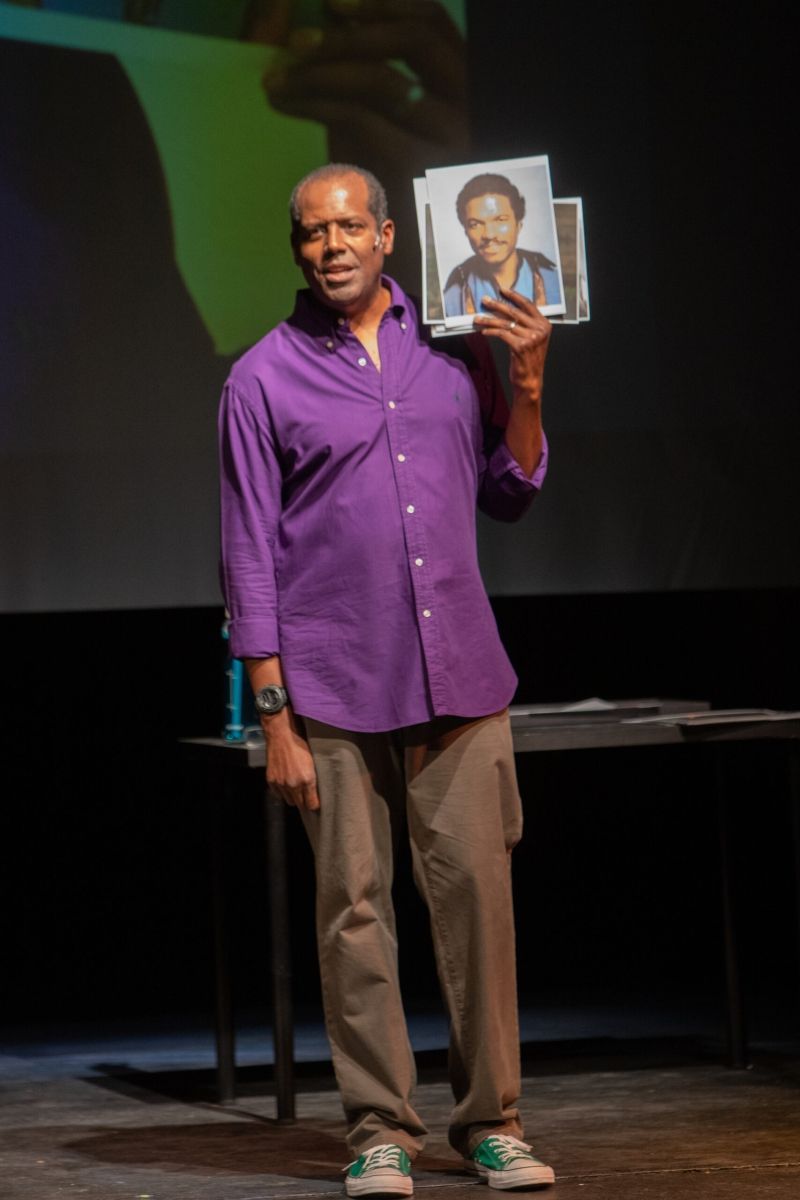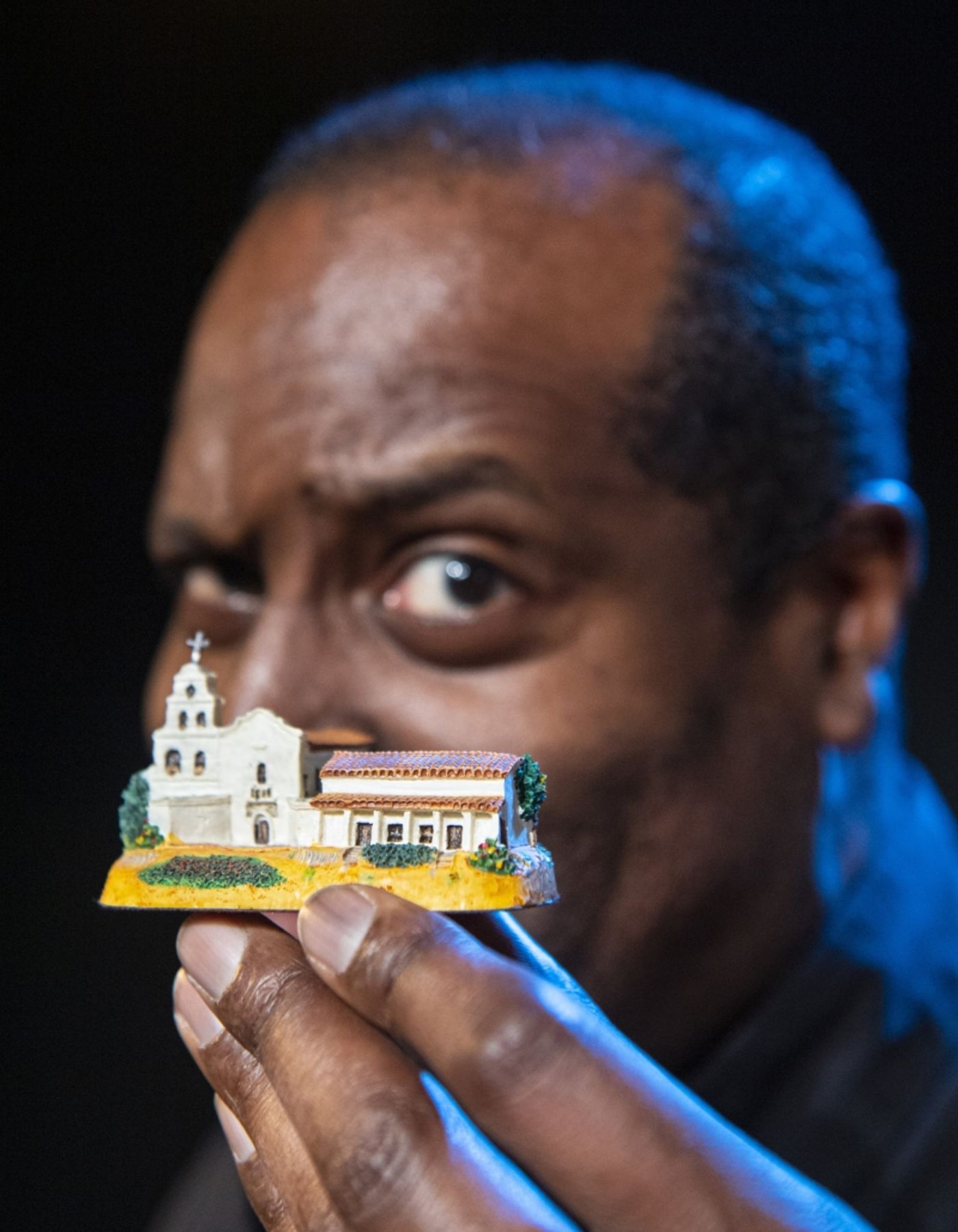Interview: Fred Pitts of AREN'T YOU...? at The Marsh Offers a Fresh Take on the History of Race Relations in America
His humorous and insightful solo show runs in San Francisco July 21 to August 18


(photo by Scott Lasky)
Have you ever been mistaken for a celebrity? Well, actor Fred Pitts certainly has – and then some. While making a tour of California’s 21 historic missions one summer, he found that at nearly every stop people were thinking he was Barry Bonds, Will Smith, Richard Roundtree, Sidney Poitier - or even Barack Obama. As he bears little resemblance to any of those men other than the color of his skin, it gradually dawned on him that something more complicated was really going on, and friends encouraged him to turn his real-life experiences into a solo show.
After several years of development, COVID-related delays and a well-received run in the East Bay, Pitts is bringing his hilarious and insightful solo show Aren’t You…? to The Marsh in San Francisco on Friday nights starting July 21st. This work deftly relates the experience of walking in the shoes of a modern Black male, including Pitts’ delightfully nerdy insights into the Missions and cogent thoughts on early California settlers’ interactions with Native Americans.
The San Francisco-based actor has been performing in the Bay Area for over 20 years at regional theaters such as Shotgun Players, African-American Shakespeare Company, Custom Made Theatre, Contra Costa Civic Theatre and Exit Theatre, among others. Pitts also racked up numerous screen credits while somehow managing to maintain an alternate career as an Emergency Medicine physician for over two decades. In fact, he is still a licensed physician, currently working in the field of drug safety.
I spoke with Pitts by phone last week from his home in San Francisco as he was preparing for this new run of Aren’t You…? We talked about how he managed to turn his experiences into a piece of theater, how he came to be a history geek, what it’s like to be essentially playing himself onstage after so many years of acting in other people’s plays, and how his experience as a physician has informed his acting. In conversation, Pitts is straightforward and down-to-earth, with an ability to mine humor even from the most serious topics. Come to think of it, he’s exactly what you’d want from a good doctor – if said doctor just happened to be a talented actor as well. The following conversation has been condensed and edited for clarity.

in Aren't You...? at The Marsh
(photo by David Allen)
What prompted you to visit all 21 California mission churches in the first place?
I am a history geek, that’s the simplest answer I can give you. I love visiting old churches, old castles, American ruins, whatever. I went to Catholic school so I heard about the missions years ago, but I was never motivated enough [to visit them]. Then I went on a wine tasting tour and visited Sonoma Mission. I loved the place, and they had these models and paintings of all 21 missions. That was when I thought “Okay, why not just do this trip? This could be kinda cool.” At that moment I didn’t think I would do one trip to do all of them, but you know once the history geek gets motivated… [laughs]
At what point in your tour did you get an inkling that this whole mistaken identity thing wasn’t just happenstance?
I was sitting at an outdoor bar in San Luis Obispo and I’d just seen Mission San Miguel where I’d had the experience of a group of Asian tourists who thought I was Barry Bonds. It had happened like four or five times before during the trip so I was just sitting at the bar thinking “This is not normal.” [laughs]
Once you’d made that realization, how did you get the notion to turn it into a theater piece?
I had been systematically posting [online] “This happened to me today...” so people would tune in to Facebook (this was like 8, 9, however many years ago) to find out what happened to Fred today, and I had friends from all over the country saying, “That happened again?!” Once the trip was over, two friends of mine, one local and one in Ohio, said, “You need to turn this into a solo show.” Which is nothing I’d ever done.
But they kept saying, “You should do it in a solo show.” So I put all the Facebook posts in a Word file and tucked it away, but in my head I kept thinking “I should do this.” Because I’m an actor and I knew about solo performance. I knew about Brian Copeland, Don Reed, Marga Gomez and I loved Whoopi Goldberg’s show she did on Broadway in ‘84. That was the first solo show I ever saw.
But I didn’t know how to write [a solo show]. I knew The Marsh had courses so after a year or two I started looking online to see about a course in creating your own solo work, but I never found the time to take the class because I was always doing a straight theater production. After I got married in 2017, I wasn’t doing any theater because my wife and I decided we were just going to take a hiatus on theater so we could learn how to be a married couple. And then I said, “Why don’t I just take this class?”
So I walked into David Ford’s class first day, pulled out my Word document with all of these piecemeal Facebook posts. I read it and he said, “OK, we can make something out of this.” Then it was about a year of classes with him, learning how to turn what I’d experienced into a show, learning how to write to be honest, to be true, to be funny – but to keep people interested and keep the story going.
I imagine lots of people think they have a fascinating story to tell about their life, but that doesn't necessarily make it a piece of theater.
Agreed. I was blessed with a hook, because I had this experience of being a geek who goes to the Catholic missions and everybody either thinks I’m a famous Black person or a Black person they know, or says something really ignorant. So David said, “There’s a story of a Black man who looks and sounds like you, who went to Catholic school as a Baptist, who went to see all these missions and had this happen. That’s what’s unique.”
So we worked on not only telling that story, but also trying to weave in a lot of other things - the history of being a Black man in this country, the history of race relations and how does it intertwine with the history of the missions and the divergent opinions of what the history is. Is it a history of just the Catholic Church, is it the history about Native Americans? Which part of the history was ignored or forgotten or glossed over?
The same thing happens with a lot of our history in general, especially for people of color. So the history geek in me helped mold it into, I hope, a more interesting story. Because it’s not just what happened to me, which is funny in a sad-but-funny kind of way. I mean, it’s a funny show, it’s not a heavy-handed show. But I do talk about what it was really to walk in the shoes of a Black man with this experience and what it’s been like for me and my love of history and how it affects us in life.
And since you truly are a history geek, that lens wasn’t imposed on you just to bring some cohesion to the piece.
Oh, no, no, no, no. My parents bought the World Book Encyclopedia set in 1972, and I started with the E volume because it was the smallest one. I looked at the pictures of all the British kings and queens, and I was hooked.
That’s something you and I actually have in common. My siblings still joke that I was the only kid they ever knew who read the encyclopedia for fun.
That’s me, totally me! I did it, too! [laughs]
I’m so glad to know I’m not the only one! [laughs]
No, I still remember reading the little paragraph on Edward Kennedy having been born in 1932 and then there was a dash because it was the 70s and he was still very much alive. I remember the California photo was the Golden Gate Bridge. I remember the British kings. I remember the page of world flags. They were so interesting and colorful.
As a veteran stage actor, what is it like to perform a play you wrote that actually comes directly from your own experience, rather than an existing play written by someone else ?
I use the word “trippy.” The experience of being a stage actor certainly helps doing a solo show. You need a certain amount of energy and a certain knack as a solo performer for entertaining, for telling a story, for creating characters, and I’ve been creating characters forever. Like I just closed A Soldier’s Play in Alameda. That was written by somebody else, I was onstage with eleven other people, and I ran with them and played with them for five weeks and loved it. But even though you’re responsible for telling the story and driving the story, you didn’t write it, it wasn’t your idea, you’re not the only one up onstage.
The most frightening thing about solo performance is it’s you. You are exposing part of yourself to the audience hoping they either get it or get something out of it. And you want to be – I hate to say the word “liked” – but you do because we’re performers, we want to entertain, you know? And we really want the story to come across. So that’s the biggest difference for me - it’s mine, I wrote it, I did it, I put it together with David.
And fortunately I have a brilliant director – ShawnJ West, a friend of mine who’s also directed me in straight theater. He’s able to sit out and watch and say, “OK, start from this character here, let’s do this here, let’s do that there. Let’s have you move all over the stage, so that you’re not just standing there telling a story; you’re living the story.” The thing that does help me is having been an actor you get comfortable in your body, you get comfortable trying to do all the physical activities that will take that person into whatever moment you’re trying to describe or bring to life.
I’m curious about the other part of your professional life. Are you still a practicing physician?
I was an ER doctor for 25 years and then I did 5 years of occupational medicine, and during that time I was medical director a couple of times. I still am a licensed physician, but now I work in the world of drug safety, so I no longer deal [directly] with patients. My job is essentially an office job, which is fine with me. And it’s a different side of medicine. For years I was prescribing the medication or taking care of the injuries or treating the heart attacks, and now I’m on the other side saying “OK, what are these people taking, and what are the side effects that could hurt them?”
When you leave practice, you find there’s a completely different world of medicine out there where you don’t have to take care of patients. And I loved it, I loved the adrenaline rush of the Emergency department – when I was younger. As I got older, I got tired of the rush, of the shifts that were all over the place. I mean, there was a weekend I remember where I worked on a Friday from 10:00am to 6:00pm, then went to the theater for a show at 8:00pm, was back in the ER the next day at 7:00am, had a Saturday night show and then because of some weird coverage issues I worked the night shift overnight until 7:00am, got home, slept for a few hours and then had to be back in the theater for a 3:00 in the afternoon show. I did that once – I would never do that again! [laughs]
It was insane. People used to ask me, “How can you be a doctor and do theater?” My answer was, “I have no choice. I’m both.” I love it, it’s part of who I am.
Since you’ve maintained this sort of bifurcated life, do you find any commonalities, any through line, between your “day job” and your performing career?
Well, if I go back to taking care of patients, moreso than what I’m doing now, the challenge was I had to be a rock in the emergency department. You want to be the calming effect for the patients you take care of, because when people walk into the ER they’re terrified of what’s going to happen to them or their loved one. So you have to keep all of your emotions in check because you see wonderful things in life and you see the tragic things in life. I dealt with a lot of deaths in the ER for years.
When I started taking acting classes again in San Francisco, my old acting teacher Cliff Osmond used to work on me specifically and say, “Look, you work in the ER. You cannot show your emotions there. What you need to work on as an actor is that once you leave the Emergency Department, this is your catharsis, this is the safest place for you to release and express all those emotions you have that you cannot express in the Emergency Department.” That was kind of life changing for me because I could keep my emotions in check in the ER, but then I’m hopefully a more honest actor because then I could just relax and be “uncontrolled” in theater.
Also, in my years of emergency medicine, I got to see thousands of personalities, and you can draw on those personalities in characters you create. I mean, we are all every kind of person that’s out there, we just don’t choose to show that. But if you can think of someone you’ve dealt with or treated, the way they spoke, the way they moved, their mannerisms, that stays in your head, so sometimes I will use something particular about a patient, their personality, in a character.
And when you’re interacting with people in the ER, you’re seeing them at their most vulnerable so they have no filters, they are who they truly are.
Exactly. And it was a privilege to take care of them, it really was.
My final question is maybe a little tongue in cheek, but I just have to ask: Is there anyone famous that you actually do think you look like?
[laughs] Uh… Richard Roundtree, in Shaft in the 70s. I had a big caterpillar moustache from the time I was 14 until 2004. In my headshots I had the caterpillar, and I would always think I looked like Richard Roundtree and sometimes people would say that. So, yeah, that one I kind of get. When I hold up a picture of my caterpillar headshot and then Richard Roundtree from promo shots from Shaft, it’s like “Yep! I can totally see that.” [laughs] So at least that comparison is realistic. The rest of them are just so out there it’s kind of hysterical. But it’s been fun, you know?
---
Aren’t You…? will be presented July 21 – August 18, 2023 with performances 7:30pm Fridays at The Marsh San Francisco, 1062 Valencia St., San Francisco. For tickets or more information, visit themarsh.org.
Videos

